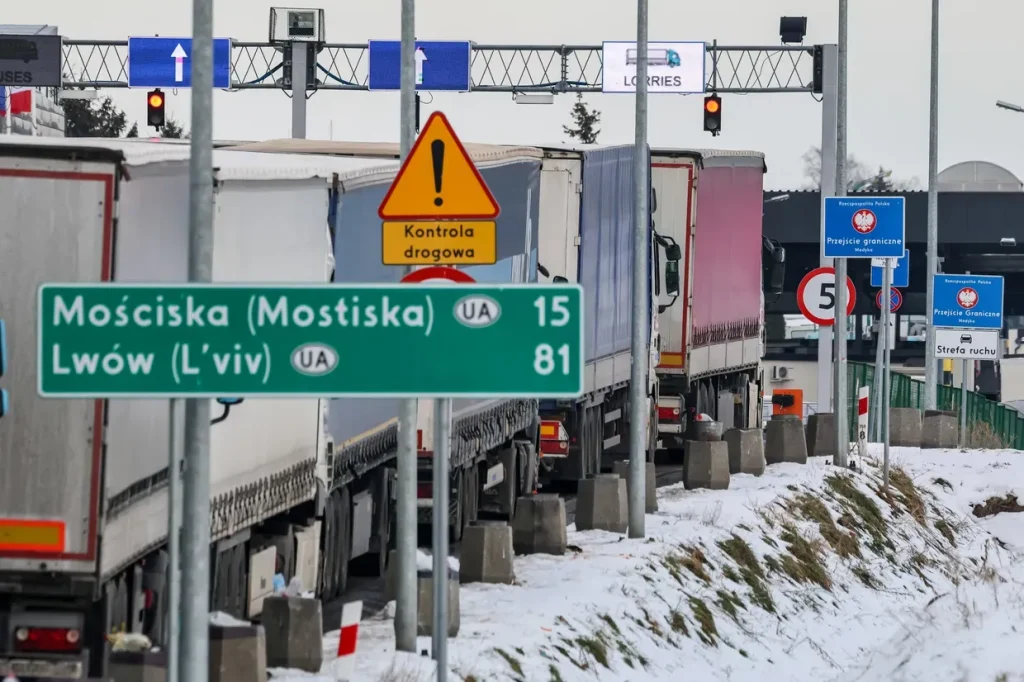Polish protesters are planning to block the Korczowa-Krakovets border crossing from April 18 for two days, in protest of Ukrainian agricultural imports and the EU’s Green Deal. This blockade will allow one vehicle per hour, excluding humanitarian and military cargo as well as passenger vehicles. The blockade follows a similar action by Polish farmers in February at several border crossings. The news comes after Polish farmers lifted their blockade at the Uhryniv-Dolhobychuv crossing. In response to the strained relations, Polish Prime Minister Donald Tusk signed a decree establishing a council for cooperation with Ukraine to address bilateral relations and Ukraine’s reconstruction efforts.
The tense situation at the Korczowa-Krakovets border crossing has been ongoing due to the protests by Polish farmers against Ukrainian agricultural imports and the EU’s Green Deal. The sporadic blockades have disrupted trade and transportation between the two countries. The blockade allowing only one vehicle per hour is a significant disruption that showcases the intensity of the protests. The exemption of humanitarian and military cargo, as well as passenger vehicles, indicates an effort to minimize the impact on essential services. The ongoing tensions highlight the need for diplomatic efforts to address the root causes of the dispute and find a resolution that benefits both countries.
The decision to establish a council for cooperation with Ukraine by Polish Prime Minister Donald Tusk signifies a recognition of the importance of bilateral relations and Ukraine’s reconstruction efforts. The council is tasked with addressing the challenges and opportunities in the relationship between Poland and Ukraine. This move indicates a willingness to engage in dialogue and collaboration to overcome the current tensions and work towards mutual benefits. The establishment of such a council provides a platform for ongoing communication and cooperation between the two countries, which is essential for resolving disputes and building stronger relations in the future.
The unrest at the border crossings between Poland and Ukraine underscores the broader implications of the protests by Polish farmers. The disruption in trade and transportation has a ripple effect on the economy and can lead to further tensions between the two countries. The need for stability and cooperation is crucial to ensure smooth relations and economic growth. The establishment of the council for cooperation with Ukraine is a step towards addressing the underlying issues and fostering a more positive relationship between Poland and Ukraine. It is essential for both countries to work together to find common ground and overcome the challenges they face.
The protests and blockades at the border crossings highlight the complexities of the relationship between Poland and Ukraine, particularly in the agricultural sector. The grievances of Polish farmers against Ukrainian agricultural imports reflect broader concerns about competition and trade policies. Addressing these concerns requires a diplomatic and cooperative approach to find solutions that are acceptable to both parties. The establishment of the council for cooperation with Ukraine is a positive step towards engaging in dialogue and addressing these issues in a constructive manner. By working together, Poland and Ukraine can build a stronger foundation for their relationship and ensure mutual benefits for both countries.
In conclusion, the ongoing protests by Polish farmers and the establishment of a council for cooperation with Ukraine by Polish Prime Minister Donald Tusk highlight the complexities and challenges in the relationship between Poland and Ukraine. The blockades at the border crossings underscore the need for diplomatic efforts to address the grievances and find solutions that benefit both countries. By engaging in dialogue and cooperation, Poland and Ukraine can overcome the current tensions and build a more positive and stable relationship. It is essential for both countries to work together to resolve disputes and promote economic growth and stability in the region.


